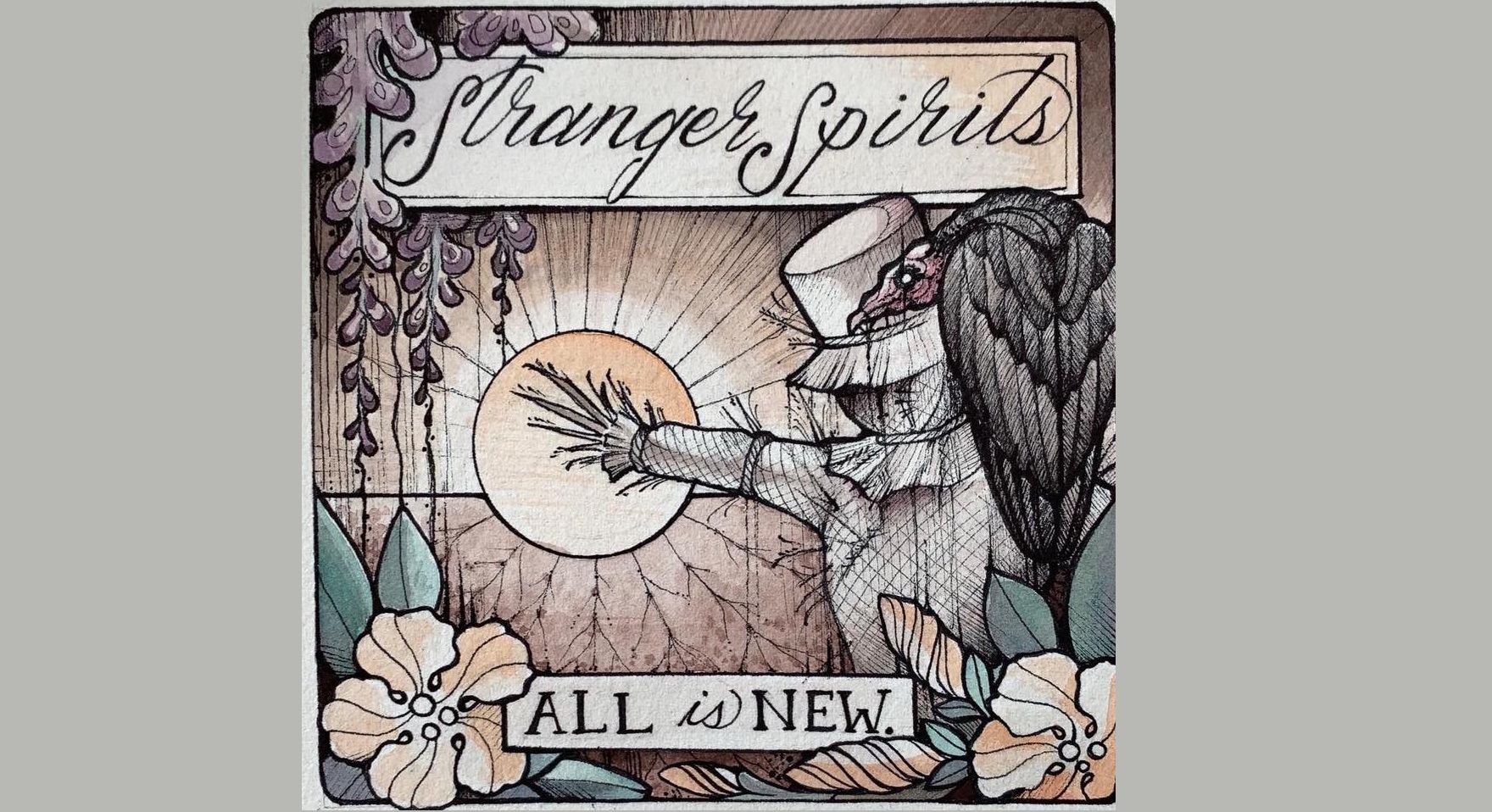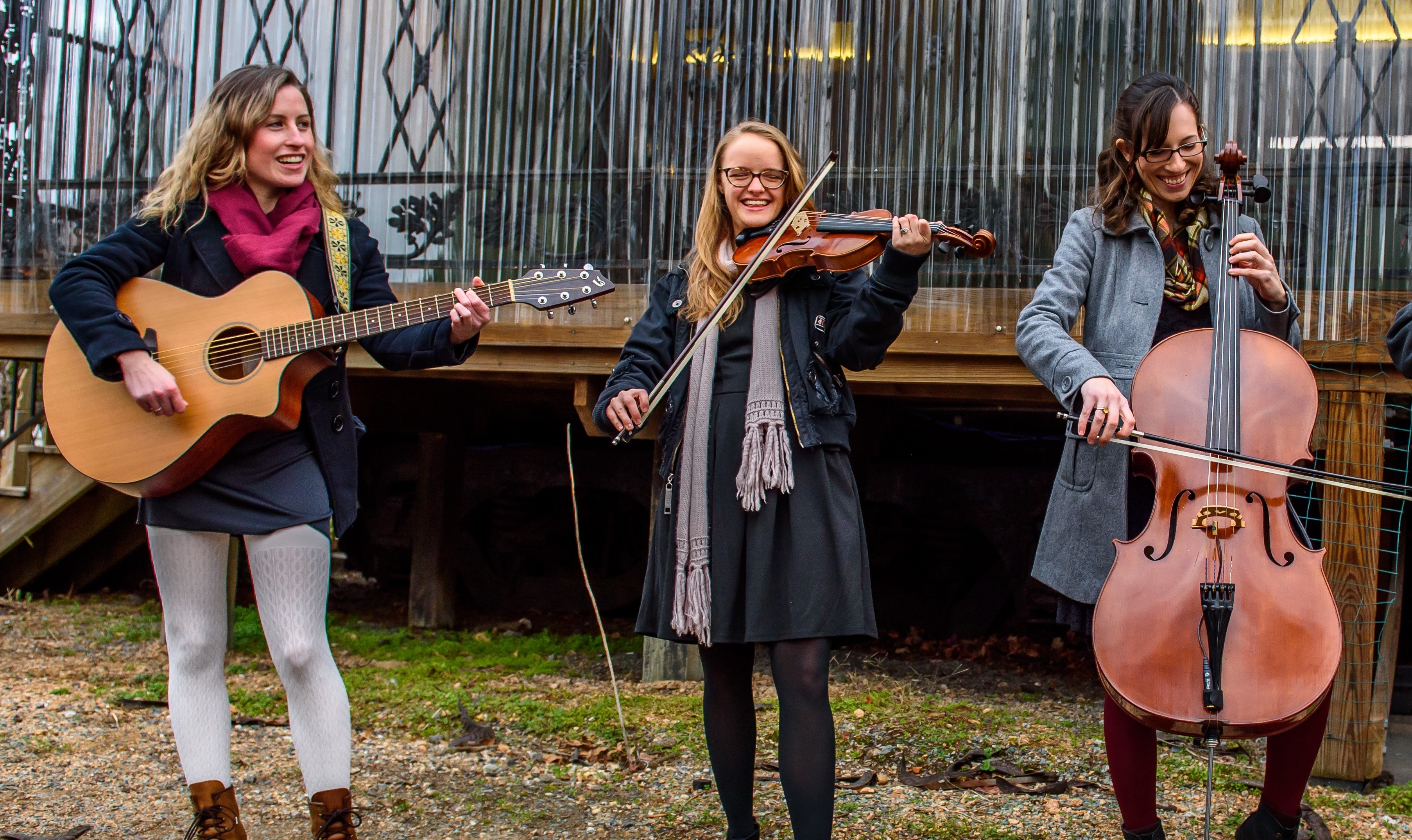Aaron Keck’s Live & Local Top 100 Countdown continues — and concludes with the best of the best! You can check out the complete series here, only on Chapelboro.com!
And finally we come to the end. Our local music scene has produced thousands of phenomenal songs over the years, and dozens of them could stake a claim to being number one – but these are our picks for the all-time top ten.
Always subject to change, though! Chapel Hill’s music reputation was probably stronger in the 90s, but if you’ve been following this series over the last nine weeks, you might have noticed a pretty heavy emphasis on songs from the last decade, and our top ten isn’t going to be much different. I’d argue that today’s local music scene is as buzzing and dynamic and productive as it’s ever been, with more great artists and a wider range of genres than we’ve ever had before – so don’t be surprised when new songs emerge to challenge the ten we’re honoring here. It’s the hallmark of any great music scene: the future is always brighter than the past.
Reminder of the ground rules: Orange, Durham, and Chatham-based artists only; no more than three songs per artist (there were two bands who hit that limit, in case you’re wondering); covers are allowed but originals are preferred; and the songs have to be radio-friendly.
Here we go!
10. Shirlette & the Dynamite Brothers (f. Justin Robinson, Daniel Hart & Adrian Duke), “Kissin and Cussin” (2011)
“…Tell me, pretty baby, do you think you’re too sweet to die?”
In “The Last Waltz,” Levon Helm described rock as an amalgamation of great, disparate genres – “country, bluegrass, blues music, show music” – all coming together from far away and blending into a new, perfect form. “If it mixes there with rhythm,” he said, “and if it dances – then you’ve got rock and roll.”
By that standard, “Kissin and Cussin” might be the most perfect rock-and-roll song ever made.
We need a history with this one. It first appeared on the Carolina Chocolate Drops’ Grammy-winning 2010 album “Genuine Negro Jig,” written by the CCDs’ Justin Robinson. It’s technically an original, but Robinson drew on decades of American music: some of the most memorable lyrics (like “too sweet to die”) came from the early-20th-century bluesman Richard “Rabbit” Brown, while the chorus and the title were inspired by an Ike & Tina Turner hit called “Cussin, Cryin, and Carryin On.” So Robinson’s “original” song was in fact nearly a century in the making, building on traditions ranging from blues to bluegrass to R&B – and all that was before spoken-word poet/hip-hop artist Shirlette Ammons and Chapel Hill rockers the Dynamite Brothers decided to cover it (with Robinson) on their breathtaking 2011 collaboration “And Lovers Like.” By the time they all went into the studio, there was hardly a single significant tradition of American music that wasn’t represented in some way.
And what they produced from that melting pot is an apocalyptic masterpiece, an epic, seven-minute roller coaster of a song about a toxic relationship, full of lust and sex and blood and drugs and money and possibly murder, that opens with an ominous, inscrutable riff before Ammons plunges in – “Your kiss is fist violent” is her very first line – and then just builds and builds and builds from there. The drums kick in at 90 seconds, laying down an insistent beat reminiscent of “When the Levee Breaks” while Ammons and Robinson do their vocal battle; I don’t know who brought the orchestra in, but there it is at the four-minute mark, rising to a crescendo that sounds like Charlie Daniels’ devil covering the end of “A Day In The Life.” And there are still three minutes left to go.
“Kissin and Cussin” is the most ambitious, blow-your-mind song the local music scene has produced; it’s one of the few songs I’ve ever heard that’s clearly trying to surpass everything that came before it. Did it succeed? That’s up for debate. But at the very least, it comes damn near close.
9. Ben Folds Five, “Mess” (1999)
“And I don’t believe in God, so I can’t be saved…”
Now I put “Brick” at number 91 and that’s obviously the bigger hit, so if you’re a purist, feel free to swap these two around. But I’ll go to my grave insisting “Mess” is the far better song – and beyond that, it also does a far better job capturing Ben Folds Five’s vibe of jaunty, peppy, piano-driven melodies ironically supporting the bitter lyrics of a hopeful protagonist who’s battling depression, full of regrets, but hellbent on overcoming and powering through. (See also “Army” off the same album, 1999’s “The Unauthorized Biography of Reinhold Messner” – but again, “Mess” is better. Fight me.)
“Mess” opens with one of Folds’ catchiest piano riffs and we’ll get a nice bouncy tambourine in the chorus, but we know what’s coming: “Oh, this mess I have made,” he sings repeatedly, castigating himself for his many mistakes – “the same mistakes over and over again,” “the things I said I’d never do, least of all to you” – that drove his lover away into someone else’s arms. He’s found someone else and he’s trying to be a better man – “I want to be for her what I could never be for you” – but he also knows the only way to do that is to close off a part of himself, maybe forever, to be “all alone” even in someone else’s arms. “There are rooms in this house that I don’t open anymore.” (Very Gothic.) Aarik Danielsen writes that “Mess” is the definitive expression of the album’s thesis statement, “the idea that to truly live is to know thyself and own every ounce of your cowardice, failure and disappointment.” Well said.
Like all of Folds’ best work, “Mess” is complex and tragic and heartbreaking and optimistic and fun, all at once. Like life, if you’re lucky.
8. Phatlynx, “Gravy” (2016)
“GRAVY!!”
Well, it wouldn’t be our top 100 without this one, right? If you listen to “Live & Local” regularly, you know “Gravy” is our signature song; Jonathan Byrd’s “Mama” (at number 13) is the one that got me interested in local music in the first place, but “Gravy” is far and away our favorite. Hopefully it’s one of yours too: fast and gleeful, clocking in under two minutes, it’s definitely one of the funnest songs the local scene has ever produced – and one of the funniest too, without a whole lot of effort.
But – a novelty song in our top ten? A thousand times yes, without hesitation. There’s not much to “Gravy” on the surface: it’s literally just two minutes of instrumental rockabilly/surf music, occasionally punctuated by the band shouting “GRAVY!” at regular intervals. But if you wanted to encapsulate the history of Chapel Hill’s music scene in as small a frame as possible, this is that capsule right here. Phatlynx draws its inspiration from Link Wray, the same North Carolina surf-music icon who also begat the Flat Duo Jets; their fun, irreverent stage presence is akin to the Squirrel Nut Zippers; and of course you can’t hear their down-home, pork-loving, State Fair style of psychobilly punk without thinking of Southern Culture on the Skids – a band Phatlynx’s Crispy Bess played in for years. “Gravy” ties all those threads together into one fast, catchy, tasty package – and it’s a pretty well-crafted song besides.
Phatlynx’s appeal is undeniable: the four guys in the band originally got together with the idea of doing a single show at the Cave, playing Link Wray’s “Rumble” with as many people as they could gather together – and they were so popular that they’ve stayed together ever since. And no wonder, because how can you say no to “Gravy”? There is no way to listen to this song and not feel better by the time it’s done. These days, we need as much of that as we can get.
7. The Future Kings of Nowhere, “Let’s Be Pirates!” (2012)
“That’s the life that they’re selling, but baby, we don’t have to buy it…”
So here’s the story behind “Let’s Be Pirates.” FKON had this song in their repertoire in the late 2000s, but they broke up without ever recording it; Shayne Miel moved to New York, Mike Hacker opened Pie Pushers, everyone got on with their lives, and that was going to be the end. And then: in 2009 Miel got diagnosed with stage 4 lymphoma, a cancer that threatened his life; he moved back to Durham to be close to the people he loved – and decided to head back into the studio one more time, reunited with his old bandmates, to record the few songs he still had banging around in his head. “I thought I would die,” he said, “and I didn’t want the songs to die with me.”
And that’s why we still have “Let’s Be Pirates,” an utterly joyous, defiant celebration of love and life in the face of a reactionary, money-driven society that values the stock market over the soul. Sick of bills and debts and “undead-end day jobs” (what a great line), Miel’s working-class hero paints a vivid dream of rebellious freedom: “I dream all day of an easier life, with the wind in my hair and the sun in my eyes … singing and dancing, a bottle of rum in the young moonlight.” It’s an impulse we’ve all felt, somewhere along the way, to just get in the car and take off and leave it all behind, and Miel captures it perfectly. “I’ll be Blackbeard, you be Bonnie, and we’ll both be pirates!”
And bonus points for the now-thankfully-anachronistic line about homophobia: “Let’s get married, or just not bother; if our friends can’t, then we shouldn’t either.” Because now this gets complicated: is the song’s anarchic, screw-it-all-and-leave-it-behind message undercut by the fact that people stayed, and fought, and won, and were actually able to make the world a better place? Is it irresponsible to hop on a ship and just sail away – not in the “I’ve got work tomorrow” sense, but in the “we can fight back if we stay” sense? Are you a hero if you walk away from Omelas, or are you just capitulating? Or is sailing away still a meaningful act of rebellion in itself? Is it enough just to say No to the powers that be, even if you don’t say anything else? You can write a dissertation just on that one line alone. For what it’s worth, when I’m singing this song to myself (which is frequent), I just switch up the line in the last chorus: “Let’s get married, it’s no trouble; grab our friends and we’ll make it a double.” Victory.
Oh, and just one more thing: Shayne Miel beat cancer. He’s still here. Double victory.
6. Reese McHenry, “Detroit” (2019)
“…I’m gonna bring him back HOME!”
And hey, speaking of great artists who nearly died and then made staggeringly triumphant comebacks: Reese McHenry shook off multiple strokes and roared back to release 2019’s “No Dados,” arguably the best local album of the decade. The whole album is full of gritty garage-rock awesomeness – “Magnolia Tree,” “Bye Bye Baby,” “Fever,” “Summer Sheets” – but nothing, nothing, holds a candle to “Detroit,” McHenry’s towering ode to an almost certainly toxic relationship (we’ve had a lot of those this week) that starts at 11 and only escalates from there. This is the hardest Chapel Hill has ever rocked, the best pure rock-and-roll song our local scene has ever produced. Superchunk? Pipe? Archers of Loaf? Reese McHenry blows ‘em all away in three minutes – and just in case you weren’t sure, she saves the absolute best for last, one final, explosive howl of pure, wild, obsessed, desperate passion that’ll knock your brain right out of your head.
Don’t just take my word for it. Here’s what other writers have had to say:
“Oh, man. McHenry’s voice is just this force.”
It’s all deserved. Every review you’ll ever read of “No Dados” compares Reese McHenry to Janis Joplin, but no, that’s not correct: once you hear “Detroit,” you’ll be comparing Janis Joplin to Reese McHenry. Crank up the volume … and stand the f— back.
5. Squirrel Nut Zippers, “Ghost of Stephen Foster” (1997)
“Camptown ladies never sang all the doo-dah day…”
Same disclaimer as with Ben Folds Five: “Hell” was the bigger Zippers hit, so if you’re a purist, feel free to put that one here and drop “Stephen Foster” to number 21. (They make a good pair, either way, and including both also lets us recognize both of the Zippers’ main songwriters: Tom Maxwell on “Hell,” Jimbo Mathus on “Foster.”) But “Stephen Foster” is the winner for me: manic and hilarious and nightmarish, from its trippy string prologue to its bouncing oompah beat to its gleefully deranged lyrics to the delightfully ominous violin solo and horn riff that wraps it all up in the end, “Ghost of Stephen Foster” is the apex of the Zippers’ amazing late-90s run. The lyrics make no sense at all – “Ships were made for sinking, whiskey made for drinking, if we were made of cellophane we’d all get stinking drunk much faster, ha ha ha!” – but it’s all so memorable, and the music is so catchy and fun, that it’ll have a place inside your head forever nonetheless. And in this case that’s a good thing.
Bonus points here for the video, directed by Matthew Nastuk and Raymond S. Persi, a flawless homage to the Fleischer Studios’ 1930s black-and-white Betty Boop and Bimbo cartoons. Outside of maybe “Sabotage,” I can’t think of a music video that complements its song as perfectly as this one does; at any rate, it’s easily the best music video the Chapel Hill scene has ever produced – fittingly, because “Ghost of Stephen Foster” is also one of its very best songs.
4. Mandolin Orange, “Of Which There Is No Like” (2015)
“Hold me tight tonight, my darling, out of the dark, dark night…”
Emily Frantz and Andrew Marlin (or their PR reps, at least) describe themselves like this: “Mandolin Orange’s music radiates a mysterious warmth – their songs feel like whispered secrets, one hand cupped to your ear.” If that’s the sound they’re aiming for, they’ve never hit the bullseye more perfectly than they do right here, in this closing track from their 2015 album “Such Jubilee.” (The album’s title is a phrase from this song.) Frantz and Marlin’s voices have never blended more beautifully, their instruments have never sounded more sweet – and yet the most overwhelming sound here is the silence you hear around them, as if the entire world has disappeared and they’re the only two beings left.
Which is appropriate, because that’s what “Of Which There Is No Like” is all about: Marlin’s character, a wandering nomad who’s always been lured “out to sea” by the excitement and adventure of the cacophonous world, finally drawn back home, “out of the dark, dark night,” into the arms of real love, which he’s never believed in before but undeniably believes in now.
There are many Mandolin Orange songs that could go in this spot: there’s a reason I instituted a three-songs-per-artist limit, and there’s a reason I called it the Mandolin Orange rule. If you’re not a fan of this one, feel free to swap in “Old Ties and Companions” or “Golden Embers” or “The Wolves” or any of a dozen others. (When it comes to radiating a mysterious warmth, they almost always succeed: I had the good fortune to host them in the WCHL studio for Carrboro’s Freight Train Blues Series earlier this year, and it was wonderful.) “Of Which There Is No Like” will forever be my favorite, though: it’s that rare love song that truly understands what love can be.
“The Wolves” does make a nice companion piece, though, come to think of it: if “No Like” is about a wanderer who’s finally drawn home for keeps, “The Wolves” is about a wanderer who’s still being pulled away. Not sure which character is closer to the real Andrew Marlin. Both equally, most likely.
3. Tift Merritt, “Bramble Rose” (2002)
“Just a real good woman nobody knows…”
Grammy nominee Tift Merritt is a profoundly gifted songwriter, and her albums have always been best when the band steps back and lets her shine. “Bramble Rose,” her 2002 debut, is still my favorite for exactly that reason – and thank goodness, because the title track is also one of the most beautiful, transcendent songs I’ve ever heard. Merritt wrote the song after seeing a wild rose and feeling an inexplicable affinity: “I was probably twenty-five or twenty-six years old, and I was really trying to become the person I wanted to be,” she told IndyWeek. “This wild rose wasn’t really polished. It wasn’t perfect. It was, on some level, self-sufficient and determined. There was some grace in that.”
We’ve had our share of gut-wrenching songs in this list, but “Bramble Rose” will wreck you a thousand times: Merritt’s protagonist is a woman who’s been hardened by life, steely and determined and rugged but suspicious and secretive, “sharp” and “hard” and “dark as a storm” – as much in need of love and companionship as anyone, but damned always to remain distant and apart, a “real good woman nobody knows.” (Though who knows what the future may hold: after all, Andrew Marlin’s protagonist in “Of Which There Is No Like” was the same way, once.)
Don Henley covered “Bramble Rose” a few years ago, with Mick Jagger and Miranda Lambert in tow, but the three of them together, great as they all are, can’t match Merritt’s original. Part of that is due to Merritt’s gorgeous voice (better than Henley’s, and that’s saying something), but the secret star of the record may be producer Ethan Johns – who not only knew enough to hold the band in check and give Merritt the spotlight, but also personally contributed that simple, heartbreaking mandolin riff that took an already-magnificent song and launched it into the stratosphere. (You’ll notice Henley’s cover kept the mandolin.)
We don’t usually get calls into the studio – we’re not that kind of show – but the first time I played “Bramble Rose” on the air, the phone rang seconds later. “What was that beautiful song?” somebody wanted to know. I’m still trying to answer that one myself.
2. Superchunk, “Everything At Once” (2010)
“Oh, the minutes and the months, the feedback and the drums, the feeling noise becomes…”
Some of the songs on this list hit me right away. “Kissin and Cussin,” for instance: the first time I listened to it, it took me a full half hour, because I just had to hear it three more times in a row. “Everything At Once” is not one of those songs: it’s the closing track off 2010’s “Majesty Shredding,” a spectacular late-period Superchunk album that also contains “Rosemarie,” “Crossed Wires,” and the opening track “Digging For Something,” almost the album’s highlight (featuring the Mountain Goats’ John Darnielle on backup vocals, because why not). It’s not easy for a single song to stand out on an album like that, and “Everything At Once” doesn’t – at first. But listen again, and again, and the layers will slowly reveal themselves: the music builds imperceptibly to a powerful climax; seemingly disjointed images of ticking clocks and music and hazy childhood memories suddenly fit together like puzzle pieces; and eventually you start to believe the premise – this really is a song about nothing and everything at once, each contained within and defined by the other.
Technically the Beatles put out one more album after “Abbey Road,” but I think we’ve all collectively agreed that “The End” is their Last Song, chronology be damned; it’s the best, most apt conclusion to their story, the perfect summary of their purpose and their message. Likewise, I know Superchunk has put out two more albums after “Majesty Shredding” (three if you count Acoustic Foolish), but again, chronology be damned: “Everything At Once” is their Last Song, their final summation, a bittersweet, Buddhist, melancholy, sad, joyful tribute to the passage of time and the meaning and meaninglessness of life, delivered by the most influential band, onstage and off, in Chapel Hill’s music history. (It’s also a pretty banging rocker besides. Superchunk wouldn’t have it any other way.)
And finally:
1. The Connells, “Stone Cold Yesterday” (1990)
“…Don’t it make you wonder, man?”
Was this your pick too? We’ve covered 99 tracks on this list (including two already by the Connells) and there are plenty more deserving songs and phenomenal artists that we weren’t able to include. We’re blessed to have one of the most vibrant music communities in the nation – it’s been that way for decades, and nothing has changed – and there have been dozens of great songs over the years that can make a strong case for number one. But we never had any doubt about this one: “Stone Cold Yesterday” is iconic, catchy, fun, nostalgic, melancholy, and uplifting all at once; it’s the culmination of the jangle-pop tradition that defined the local scene’s early years, from Arrogance to Let’s Active to the dB’s; and it placed the Connells on the vanguard of the exploding “Chapel Hill scene” of the early 90s that grabbed national attention and produced some of the decade’s most beloved monster hits. And besides, it’s just a great, great song.
No more words needed: just listen and enjoy, and then maybe listen again. And again. Nobody’s judging.
What do you think about our top 100? What did we miss? What did we overrate or underrate? Listen to all the songs for yourself and comment!
Chapelboro.com does not charge subscription fees. You can support local journalism and our mission to serve the community. Contribute today – every single dollar matters.










